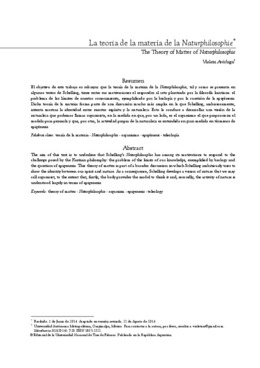La teoría de la materia de la Naturphilosophie
The theory of matter of Naturphilosophie
Abstract
El objetivo de este trabajo es subrayar que la teoría de la materia de la Naturphilosophie, tal y como se presenta en algunos textos de Schelling, tiene entre sus motivaciones el responder al reto planteado por la filosofía kantiana: el problema de los límites de nuestro conocimiento, ejemplificado por la biología y por la cuestión de la epigénesis. Dicha teoría de la materia forma parte de una discusión mucho más amplia en la que Schelling, ambiciosamente, intenta mostrar la identidad entre nuestro espíritu y la naturaleza. Esto lo conduce a desarrollar una visión de la naturaleza que podemos llamar organicista, en la medida en que, por un lado, es el organismo el que proporciona el modelo para pensarla y que, por otro, la actividad propia de la naturaleza es entendida en gran medida en términos de epigénesis. The aim of this text is to underline that Schelling’s Naturphilosophie has among its motivations to respond to the challenge posed by the Kantian philosophy: the problem of the limits of our knowledge, exemplified by biology and the question of epigenesis. This theory of matter is part of a broader discussion in which Schelling ambitiously tries to show the identity between our spirit and nature. As a consequence, Schelling develops a vision of nature that we may
call organicist, to the extent that, firstly, the body provides the model to think it and, secondly, the activity of nature is understood largely in terms of epigenesis

